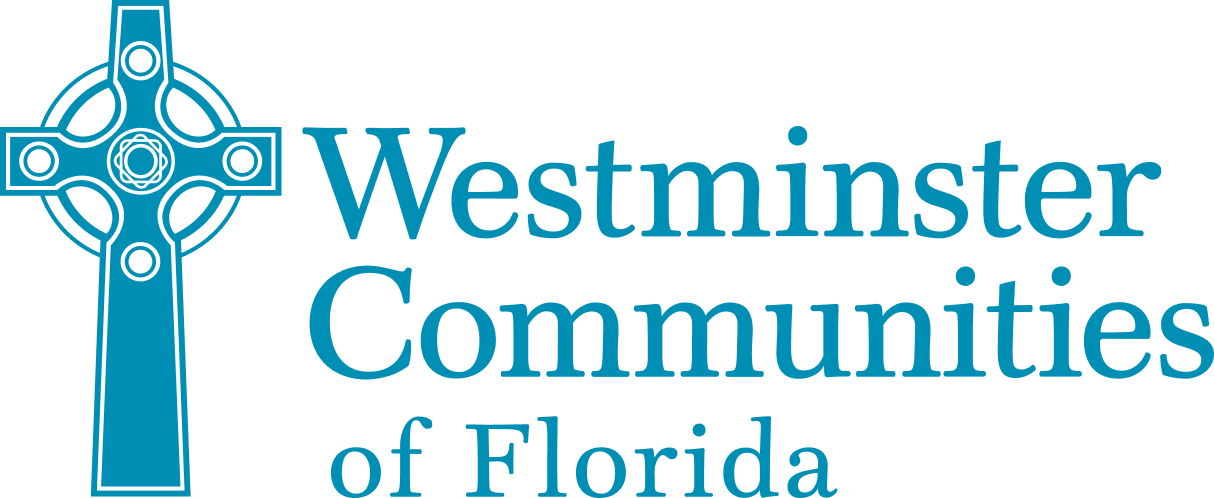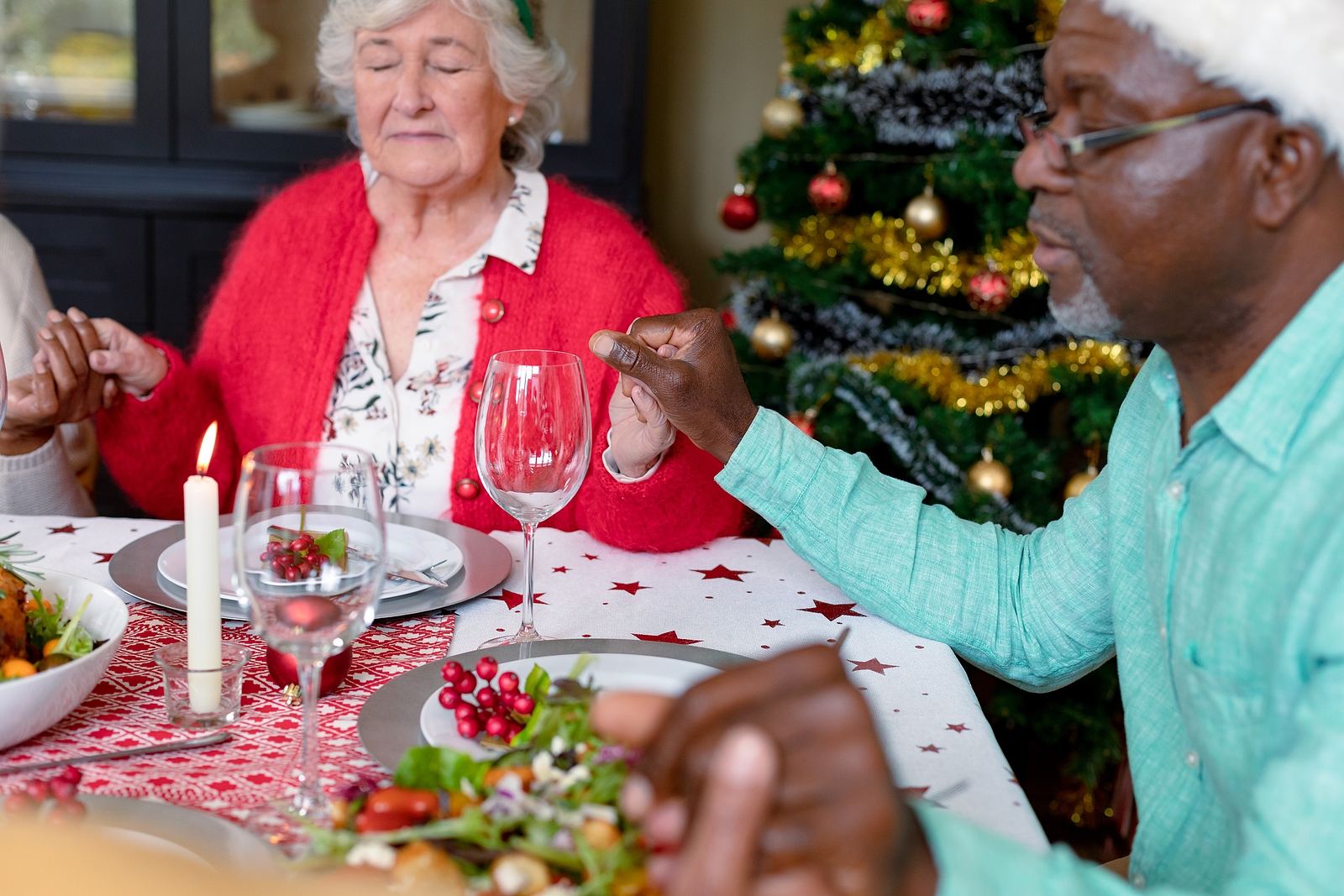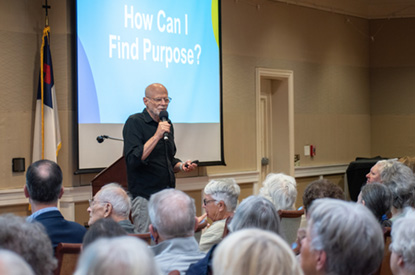The holiday season often paints a picture of warmth, family gatherings, and festive cheer. Yet, for many seniors, winter can paradoxically usher in feelings of loneliness and senior isolation during holidays. Shorter days, cooler weather, and the absence of immediate family can contribute to holiday depression and impact senior mental health.
But there’s a powerful, often overlooked tool that can transform the winter months from a season of potential loneliness into one of deeper connection: gratitude. When we express genuine appreciation to others, something remarkable happens—we don’t just brighten someone else’s day; we strengthen the very social bonds that protect our own well-being. Gratitude is truly a two-way gift that benefits both the giver and the receiver.
At Westminster Communities of Florida, we believe that vibrant social connections are essential for well-being, especially during the colder months. Our communities across Florida are designed to foster engaging environments where residents can combat isolation through a rich tapestry of activities, friendships, and support—all enhanced by a culture of appreciation and mutual care.
If you or a loved one is looking for ways to stay connected and uplifted this winter, here are four practical strategies that weave gratitude into everyday interactions, helping you beat holiday loneliness and enhance mental health for seniors.
Understanding Gratitude’s Power Against Isolation
Before we explore specific strategies, it’s important to understand why gratitude is such an effective antidote to senior isolation during holidays:
Strengthens Relationships: When you express genuine appreciation, you acknowledge someone’s value and impact on your life. This validation deepens bonds and encourages others to reach out to you more often.
Creates Positive Cycles: Gratitude is contagious. When you thank someone or express appreciation, they’re more likely to feel positive emotions and pass kindness forward, creating a ripple effect throughout your community.
Shifts Internal Focus: Practicing gratitude redirects attention from what’s missing to what’s present, reducing feelings of loneliness and holiday depression by highlighting the connections you do have.
Builds Social Capital: Regular expressions of thanks and appreciation create a reservoir of goodwill, making it easier to ask for help when needed and fostering a supportive network that combats isolation.
Now, let’s explore how to integrate gratitude into four key strategies for staying socially connected this winter.
1. Embrace Community Events with a Grateful Heart
One of the most powerful antidotes to senior isolation during holidays is proactive engagement in community life. A supportive environment like independent living at Westminster Communities of Florida offers a packed calendar of senior holiday activities specifically designed to bring people together. When you approach these gatherings with intentional gratitude, you multiply their benefits for senior mental health.
How to Integrate Gratitude:
Express Appreciation to Organizers: Take a moment to thank the staff member or resident volunteer who planned an event. A simple “Thank you for organizing this—it really brightened my day” creates a meaningful connection and encourages more of these gatherings.
Acknowledge Fellow Participants: During group activities, express appreciation for others’ contributions. “I loved hearing your perspective,” or “Your energy made this so much more fun,” validates others and invites deeper friendships.
Share What You’re Grateful For: Many holiday gatherings include moments for reflection. Be willing to share specific gratitude—”I’m grateful for the laughter around this table” or “I appreciate how welcoming everyone has been.” Vulnerability invites connection.
Engaging Senior Holiday Activities:
Festive Celebrations: Look for holiday parties, special dining events, and themed gatherings. These events create shared joyous experiences and opportunities for lighthearted interaction. Express thanks to your tablemates for their company.
Creative Workshops: Participate in craft sessions where you can make decorations or gifts for others. Creating something for someone else is itself an act of gratitude. Just as gardening connects us to nature and community, crafting for others deepens social bonds. Engaging in art can be wonderfully therapeutic for senior mental health.
Musical Performances: Attend concerts, caroling events, or talent shows. Music has a unique ability to uplift spirits and create a sense of shared joy and belonging. Thank the performers personally after the show—they’ll remember your kindness.
Volunteering Opportunities: Giving back to others can be incredibly rewarding and is one of the purest expressions of gratitude for your own blessings. Many communities organize charitable drives or opportunities to support local causes, providing a sense of purpose and connection.
Regular participation in these kinds of group activities, approached with gratitude and appreciation for both the experience and the people sharing it, transforms the winter months from a time of potential withdrawal into a season of spirited engagement and deepening friendships.
2. Leverage Technology to Share Appreciation Across Distances
While in-person interactions are invaluable, technology offers powerful tools to combat isolation, especially when geographical distance separates families. Embracing digital platforms—especially to express gratitude—can significantly boost mental health for seniors by keeping them connected to loved ones near and far.
How to Integrate Gratitude:
Thank You Video Messages: Instead of just a regular video call, occasionally record a short video message expressing specific gratitude: “I’ve been thinking about how you helped me last month, and I wanted to say thank you.” These messages can be saved and rewatched, extending their emotional impact.
Gratitude-Focused Calls: During video calls, make it a practice to share at least one thing you appreciate about the other person or something they did recently. This transforms routine check-ins into meaningful exchanges that strengthen bonds.
Appreciation Posts: If you use social media, post public appreciation for friends, family members, or community members. Acknowledging others publicly amplifies the positive feelings and encourages a culture of gratitude.
Digital Thank You Notes: Send thoughtful emails or text messages thanking people for specific actions or qualities. “I was just remembering how patient you were when teaching me to use this app—thank you” creates a lasting connection.
Technology Tools for Connection:
Video Calls: Schedule regular video calls with family and friends using platforms like Zoom, FaceTime, or WhatsApp. Seeing faces, not just hearing voices, makes a huge difference in how connected you feel—and expressing gratitude face-to-face, even digitally, carries more emotional weight.
Online Groups and Forums: Explore interest-based online groups. Whether it’s a book club, a gardening forum, or a group dedicated to a favorite hobby, these can provide intellectual stimulation and new social circles. Express appreciation for others’ contributions to discussions.
Digital Photo Sharing: Create shared digital photo albums with family members, and add grateful captions: “So thankful for this memory” or “I love seeing you all together.” Seeing recent pictures while expressing appreciation helps seniors feel included in their loved ones’ lives.
Online Games: Participate in online games with friends or family. Many platforms offer simple, fun games that can be played collaboratively, providing laughter and friendly competition. Thank your gaming partners for making time to play with you.
Westminster Communities of Florida often provides support and resources to help residents get comfortable with new technologies, making these gratitude-filled connections even easier.
3. Cultivate Strong Neighbor Relationships Through Daily Appreciation
People living right next door or down the hall can become an invaluable support system in fighting isolation. Strong neighbor relationships are a cornerstone of positive senior mental health, particularly during the quieter winter period. When you intentionally express gratitude to neighbors, you transform casual acquaintances into a chosen family. As second-generation residents have discovered, these deep community connections become one of life’s greatest treasures.
How to Integrate Gratitude:
Verbal Appreciation: Make it a habit to specifically thank neighbors for small kindnesses: “I appreciate you holding the door yesterday,” or “Thank you for always having a smile when I see you.” These micro-moments of gratitude accumulate into strong bonds.
Gratitude Notes: Leave small thank-you notes for neighbors who’ve helped you or brightened your day. A handwritten note has a lasting impact and shows you took time to acknowledge them.
Appreciation Gatherings: Host a small “gratitude tea” or coffee hour where everyone shares something they appreciate about the community or each other. This creates positive momentum and deepens relationships.
Acts of Service as Gratitude: Show appreciation through helpful actions—bringing in a neighbor’s newspaper, sharing baked goods, or offering assistance. Actions often speak louder than words.
Ways to Connect with Neighbors:
Shared Meals: Organize a potluck dinner or simply share a meal with a few neighbors. Food often brings people together and creates a comfortable setting for conversation. Express gratitude for each person’s presence and contributions.
Regular Check-Ins: Make a habit of checking in on neighbors, especially those you know might be spending more time alone. A quick chat, a shared cup of tea, or an offer of help can brighten someone’s day. Thank them for their time and company.
Form a Book Club or Card Group: Small, consistent group activities are excellent for building deep, lasting friendships. These regular meetups provide something to look forward to and a sense of routine. Share gratitude for the group and individual members regularly.
Walk Together: If the weather permits, even a short stroll with a neighbor can be a great way to stay active and connected—express appreciation for their companionship and conversation.
These everyday interactions, infused with genuine gratitude and appreciation, can significantly alleviate senior isolation during holidays and foster a robust sense of belonging within the community.
4. Prioritize Self-Care and Gratitude-Based Mental Well-Being
Beyond external connections, nurturing your inner self is paramount for mental health for seniors. The winter months, with their potential for holiday depression, make self-care even more vital. Remarkably, one of the most effective self-care practices is cultivating gratitude—both for yourself and for the good things in your life, however small they might seem.
How to Integrate Gratitude:
Gratitude Journaling: Each day, write down three things you’re grateful for. Research shows this simple practice significantly reduces depression and increases life satisfaction. Include both big and small items: “warm sunshine through my window,” “a kind word from a neighbor,” “my health today.”
Self-Compassion and Self-Appreciation: Practice thanking yourself for getting through difficult days, for taking care of your health, and for reaching out to others. Self-gratitude reduces negative self-talk and builds resilience.
Gratitude Meditation: During mindfulness practice, focus on people, experiences, or aspects of your life you appreciate. This redirects attention from worries to blessings, reducing anxiety and holiday depression.
Reflect on Past Kindnesses: When feeling lonely, recall specific times when others showed you care and appreciation. This reminds you of your value and your connections, even when people aren’t physically present.
Self-Care Practices for Mental Health:
Maintain a Routine: Stick to a regular sleep schedule, healthy eating habits, and consistent exercise. Routine provides stability and purpose. Blue Zone habits show us that consistent daily practices support longevity and well-being—including gratitude practices.
Mindfulness and Meditation: Practice mindfulness or simple meditation. Even a few minutes of quiet reflection each day can reduce stress and enhance feelings of calm. Use this time to cultivate appreciation for your breath, your body, and your life.
Engage in Hobbies: Dedicate time to hobbies you love, whether it’s reading, painting, knitting, or listening to music. These activities bring personal joy and fulfillment. Express gratitude for your abilities and interests.
Seek Support When Needed: If feelings of sadness or loneliness persist, reach out to a trusted friend, family member, or professional counselor. Many Westminster Communities offer wellness coordinators who can provide guidance and resources. Thank them for their support—they appreciate knowing they’ve made a difference.
The Ripple Effect of Gratitude
When you consistently express genuine appreciation to others, you create a ripple effect that extends far beyond individual interactions. Your gratitude inspires others to be more grateful, creating a more positive community atmosphere. People who feel appreciated are more likely to reach out, check in, and offer support—creating exactly the network of connection that combats senior isolation during holidays.
This two-way gift of gratitude doesn’t just fight loneliness; it transforms winter from a season to endure into an opportunity to deepen the relationships that give life meaning and joy.
Take the Next Step
By implementing these four strategies—from engaging in vibrant senior holiday activities with appreciation to cultivating gratitude-infused neighbor bonds—seniors can effectively combat senior isolation during holidays and ensure the winter months are filled with joy, purpose, and genuine connection.
At Westminster Communities of Florida, we are dedicated to fostering environments where mental health for seniors is prioritized year-round through meaningful connections and mutual appreciation. We provide the calendar, amenities, and supportive network designed to help you thrive emotionally and socially.
Discover how Westminster Communities creates a culture where gratitude flows naturally and social connections flourish. Contact us today to learn how our communities can help you experience the two-way gift of appreciation and belonging this winter and beyond.




